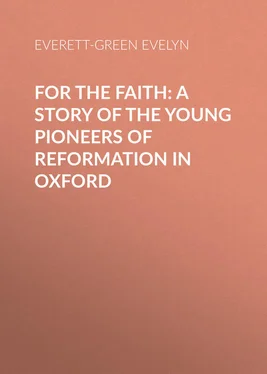Evelyn Everett-Green - For the Faith - A Story of the Young Pioneers of Reformation in Oxford
Здесь есть возможность читать онлайн «Evelyn Everett-Green - For the Faith - A Story of the Young Pioneers of Reformation in Oxford» — ознакомительный отрывок электронной книги совершенно бесплатно, а после прочтения отрывка купить полную версию. В некоторых случаях можно слушать аудио, скачать через торрент в формате fb2 и присутствует краткое содержание. Жанр: foreign_antique, foreign_prose, на английском языке. Описание произведения, (предисловие) а так же отзывы посетителей доступны на портале библиотеки ЛибКат.
- Название:For the Faith: A Story of the Young Pioneers of Reformation in Oxford
- Автор:
- Жанр:
- Год:неизвестен
- ISBN:нет данных
- Рейтинг книги:5 / 5. Голосов: 1
-
Избранное:Добавить в избранное
- Отзывы:
-
Ваша оценка:
- 100
- 1
- 2
- 3
- 4
- 5
For the Faith: A Story of the Young Pioneers of Reformation in Oxford: краткое содержание, описание и аннотация
Предлагаем к чтению аннотацию, описание, краткое содержание или предисловие (зависит от того, что написал сам автор книги «For the Faith: A Story of the Young Pioneers of Reformation in Oxford»). Если вы не нашли необходимую информацию о книге — напишите в комментариях, мы постараемся отыскать её.
For the Faith: A Story of the Young Pioneers of Reformation in Oxford — читать онлайн ознакомительный отрывок
Ниже представлен текст книги, разбитый по страницам. Система сохранения места последней прочитанной страницы, позволяет с удобством читать онлайн бесплатно книгу «For the Faith: A Story of the Young Pioneers of Reformation in Oxford», без необходимости каждый раз заново искать на чём Вы остановились. Поставьте закладку, и сможете в любой момент перейти на страницу, на которой закончили чтение.
Интервал:
Закладка:
There was a very strong tie asserting itself amongst certain men of varying ages and academic rank at Oxford at this time. Certain publications of Martin Luther had found their way into the country, despite the efforts of those in authority to cheek their introduction and circulation. And with these books came also portions of the Scriptures translated into English, which were as eagerly bought and perused by vast numbers of persons.
Martin Luther was no timid writer. He denounced the corruptions he had noted in the existing ordinances of the church with no uncertain note. He exposed the abuses of pardons, pilgrimages, and indulgences in language so scathing that it set on fire the hearts of his readers. It seemed to show beyond dispute that in the prevailing corruption, which had gradually sapped so much of the true life and light from the Church Catholic, money was the ruling power. Money could purchase masses to win souls from purgatory; money could buy indulgences for sins committed; money could even place unfit men of loose life in high ecclesiastical places. Money was what the great ones of the church sought-money, not holiness, not righteousness, not purity.
This was the teaching of Martin Luther; and many of those who read had no means of knowing wherein he went too far, wherein he did injustice to the leaven of righteousness still at work in the midst of so much corruption, or to the holy lives of hundreds and thousands of those he unsparingly condemned, who deplored the corruption which prevailed only less earnestly than he did himself. It was small wonder, then, that those in authority in this and other lands sought by every means in their power to put down the circulation of books which might have such mischievous results. And as one of Martin Luther's main arguments was that if men only read and studied the Scriptures for themselves in their own mother tongue, whatever that tongue might be, they would have power to judge for themselves how far the practice of the church differed from apostolic precept and from the teachings of Christ, it was thought equally advisable to keep out of the hands of the people the translated Scriptures, which might produce such heterodox changes in their minds; and all efforts were made in many quarters to stamp out the spreading flames of heresy in the land.
Above all things, it was hoped that the leaven of these new and dangerous opinions would not penetrate to the twin seats of learning, the sister universities of Oxford and Cambridge.
Cardinal Wolsey had of late years been busy and enthusiastic over his munificent gift of a new and larger college to Oxford than any it had possessed before. To be sure, he did not find all the funds for it out of his private purse. He swept away the small priory of St. Frideswyde, finding homes for the prior and few monks, and confiscating the revenues to his scheme; and other small religious communities were treated in like manner, in order to contribute to the expenses of the great undertaking. Now a fair building stood upon the ancient site of the priory; and two years before, the first canons of Cardinal College (as Christ Church used to be called) were brought thither, and established in their new and most commodious quarters. And amongst the first of these so-called Canons or Senior Fellows of the Foundation was Master John Clarke, a Master of Arts at Cambridge, who was also a student of divinity, and qualifying for the priesthood. Wolsey had made a selection of eight Cambridge students, of good repute for both learning and good conduct, and had brought them to Oxford to number amongst his senior fellows or canons; and so it had come about that Clarke and several intimate associates of his had been translated from Cambridge to Oxford, and were receiving the allowance and benefits which accrued to all who were elected to the fellowships of Cardinal College.
But though Wolsey had made all due inquiries as to the scholarship and purity of life and conduct of those graduates selected for the honour done them, he had shown himself somewhat careless perhaps in the matter of their orthodoxy, or else he had taken it too much for granted. For so it was that of the eight Cambridge men thus removed to Oxford, six were distinctly "tainted" by the new opinions so fast gaining ground in the country, and though still deeply attached to the Holy Catholic Church, were beginning to revolt against many of the abuses of the Papacy which had grown up within that church, and were doing much to weaken her authority and bring her into disrepute with thinking laymen-if not, indeed, with her own more independent-minded priests.
John Clarke was a leading spirit amongst his fellows at Cardinal College, as he had been at Cambridge amongst the graduates there. It was not that he sought popularity, or made efforts to sway the minds of those about him, but there was something in the personality of the man which seemed magnetic in its properties; and as a Regent Master in Arts, his lectures had attracted large numbers of students, and whenever he had disputed in the schools, even as quite a young man, there had always been an eager crowd to listen to him.
Last summer an unwonted outbreak of sickness in Oxford had driven many students away from the city to adjacent localities, where they had pursued their studies as best they might; and at Poghley, where some scholars had been staying, John Clarke had both preached and held lectures which attracted much attention, and aroused considerable excitement and speculation.
Dr. Langton had taken his two daughters to Poghley to be out of the area of infection, and there the family had bettered their previous slight acquaintance with Clarke and some of his friends. They had Anthony Dalaber and Hugh Fitzjames in the same house where they were lodging; and Clarke would come and go at will, therein growing in intimacy with the learned physician, who delighted in the deep scholarship and the original habit of thought which distinguished the young man.
"If he live," he once said to his daughters, after a long evening, in which the two had sat discoursing of men and books and the topics of the day-"if he live, John Clarke will make a mark in the university, if not in the world. I have seldom met a finer intellect, seldom a man of such singleness of mind and purity of spirit. Small wonder that students flock to his lectures and desire to be taught of him. Heaven protect him from the perils which too often threaten those who think too much for themselves, and who overleap the barriers by which some would fence our souls about. There are dangers as well as prizes for those about whom the world speaks aloud."
Now the students had returned to Oxford, the sickness had abated, and Dr. Langton had brought his daughters back to their beloved home. But the visits of John Clarke still continued to be frequent. It was but a short walk through the meadows from Cardinal College to the Bridge House. On many a pleasant evening, his work being done, the young master would sally forth to see his friends; and one pair of soft eyes had learned to glow and sparkle at sight of him, as his tall, slight figure in its dark gown was to be seen approaching. Magdalen Langton, at least, never wearied of any discussion which might take place in her presence, if John Clarke were one of the disputants.
And, indeed, the beautiful sisters were themselves able to follow, if not to take part in, most of the learned disquisitions which took place at their home. Their father had educated them with the greatest care, consoling himself for the early loss of his wife and the lack of sons by superintending the education of his twin daughters, and instructing them not only in such elementary matters as reading and writing (often thought more than sufficient for a woman's whole stock in trade of learning), but in the higher branches of knowledge-in grammar, mathematics, and astronomy, as well as in the Latin and French languages, and in that favourite study of his, the Greek language, which had fallen so long into disrepute in Oxford, and had only been revived with some difficulty and no small opposition a few years previously.
Читать дальшеИнтервал:
Закладка:
Похожие книги на «For the Faith: A Story of the Young Pioneers of Reformation in Oxford»
Представляем Вашему вниманию похожие книги на «For the Faith: A Story of the Young Pioneers of Reformation in Oxford» списком для выбора. Мы отобрали схожую по названию и смыслу литературу в надежде предоставить читателям больше вариантов отыскать новые, интересные, ещё непрочитанные произведения.
Обсуждение, отзывы о книге «For the Faith: A Story of the Young Pioneers of Reformation in Oxford» и просто собственные мнения читателей. Оставьте ваши комментарии, напишите, что Вы думаете о произведении, его смысле или главных героях. Укажите что конкретно понравилось, а что нет, и почему Вы так считаете.












